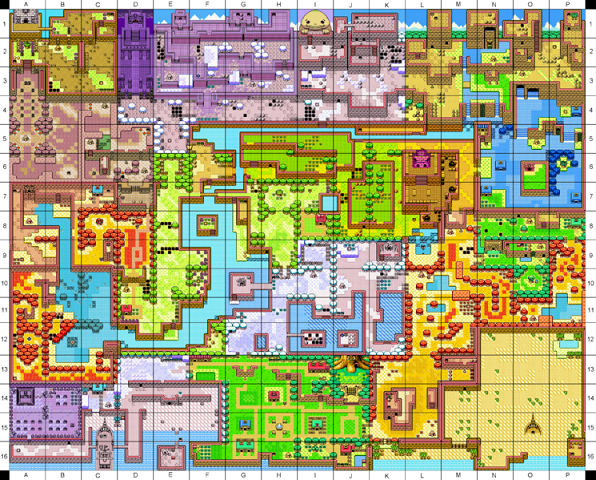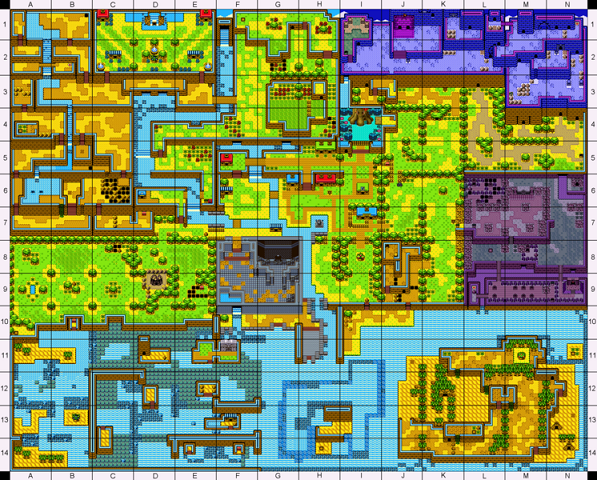




| [Blogging] What Makes Zelda Great - The Oracles April 23, 2009 — by |
|
The Oracle games had a rather tumultuous development: they were mainly developed by Capcom, who later requested Nintendo's assistance to help decide exactly what kind of games they wanted to create for the Game Boy Color. At first it was meant to be a trilogy of games, each one centered on a different gimmick (seasons, color, and time) and a different portion of the Triforce (Power, Wisdom, and Courage). The difficulty with making a password system to link all three games, however, proved too great; in time they would reduce it to a simple duology that focused on Seasons and Time, and would come to remove almost all references to the Triforce, instead focusing on the power of the Oracles of Seasons and Ages. Oracle of Seasons and Oracle of Ages each have their own unique aspects, and we could really do separate articles for each one. Yet the games are inexorably tied together via their central feature: the linking system. Because of this system, the games really aren't standalone titles (though they can certainly function as such) – one game becomes the continuation of the other, and allows you to unravel all the mysteries of each title. But let's start by looking at the differences between the two titles. Oracle of Seasons takes place in the land of Holodrum, home of Din, the titular Oracle. Early on Din is captured by Onox, the General of Darkness, who then proceeds to sink the Temple of Seasons beneath the earth, and this results in the seasons of Holodrum being thrown completely out of whack. It is entirely possible for Link to enter a tunnel in springtime, and emerge into the frigid wastelands of winter. This is the more action based of the two games, giving us enemies and bosses that require an aggressive approach to defeat. Fortunately puzzles just aren't shoved aside – there are several new items in this entry that require practice to use and master, such as the Magnetic Gloves, the Hyper Slingshot, and my personal favorite, Roc's Cape. There are plenty of puzzles scattered about which make use of these items and their effects to provide a true Zelda experience, but in the end, their main use is going to be discovering new ways to defeat the many foes that stand in between Link and his goal of rescuing Din.
Speaking of items and puzzles, however, we can't forget the most important item in the game: the Rod of Seasons, which allows you to switch from one season to the next in a given area by simply swinging it atop a tree stump. The Rod of Seasons is what really makes OoS so fantastic – being able to go from Spring to Summer to Autumn to Winter is a simple task, and the differences these changes introduce into the overworld make me want to say that OoS holds the record for most unique overworlds in a single game: one for each season, as well as the hidden underground world of Subrosia, for a total of five. Five worlds that can be explored, each holding new and interesting twists on the realm of Holodrum…simply amazing.

And it’s got the Tarm Ruins, too! (there, I fulfilled my obligation to HNS)
Oracle of Ages, on the other hand, occurs in Labrynna, a second new country introduced to the Zeldaverse, and focuses around time's Oracle, Nayru. Rather than being merely kidnapped, Nayru becomes possessed by the Sorceress of Shadows, Veran, who begins using her powers as the Oracle of Ages to tamper with the history of Labrynna. Link is forced to travel 400 years into the past and back again in order to undo the changes and free the world of Veran's taint. Ages takes the opposite route from Seasons, choosing to place a heavy emphasis on puzzle solving. There are several boss 'fights' that really function as puzzles – whether it involves timing or clever strategizing, there's hardly ever a simple manner in which to start slashing away at your enemies. You'll do plenty of slashing, don't get me wrong, but everything in this game is geared towards thoughtful consideration and careful planning. Several items reflect this fact: the Switch Hook lets you trade places with anything that the claw can latch on to; seeds shot from the Seed Shooter will rebound against walls twice before exploding, giving you a chance to kill enemies that you can't even see; the Cane of Somaria and its block-summoning power returns. And the central item is the Harp of Ages, an instrument that eventually allows you to travel back and forth through time at will. While several games in the series have had a time-based aspect, I daresay OoA deserves an award for how it handles its time traveling ability (even if it does call into question several items related to the Zelda timeline *coughOoTSplitTimelinecough*). 
These two games were meant to be played together, but one of the interesting parts of the Oracle games is that you can play them in either order and still receive a complete experience. While each game seems separate, as you play through you'll notice bits and pieces that suggest that Onox and Veran are only pawns in a larger game. When you start a Linked game through use of the password system, the story becomes slightly modified so as to build up to a climax that surpasses that of fighting Onox and Veran and instead leads into the revival of Ganon himself. And the linking system doesn't stop with just the storyline. There are dozens of uses for the passcodes, including obtaining new items and enhancing old ones, or maybe bringing items from one game to the other. The best example of this last one would be the Ring system – there are over one hundred and fifty different rings scattered throughout the games, and they can be transferred back and forth from game to game any time you want. Some rings can only be found in one title, so this is a definite bonus. Also, certain people who appear in both titles, and they'll recognize and act differently around you if play a linked game. There's even a boy that you can name in one of the games and watch grow up; if you link up files, the kid will keep the name you gave him in the first place. Shortcomings? Well, likely you're going to prefer one game over the other depending on your playing style – puzzle lovers will be drawn to Oracle of Ages, while brawlers will play Oracle of Seasons again and again. And some of the challenges are really infuriating if it isn't your style of gameplay – thinkers might despise the difficult fights that await them in Seasons (Onox's final form is freakin' hard), and warriors at heart will learn to hate some of the puzzles found in Ages (like where you have to walk over every tile in a certain room without getting locked in a corner).
Really, though, these complaints are minor. Chances are you're going to love one and simply like the other; Capcom did a great job of making it so that very few people will hate one or both. And since they aren't required, you can just ignore any sidequest you find annoying or pointless; there's plenty of other things to occupy your time. A plethora of sidequests, three different partners – each of which vastly changes how you play through the games – to choose from, characters that change and grow over time, some great music, two games that each can be played separately or in a linked form… This is what makes the Oracles into Kings of Replayability. Wow, it sure is easy to take up space when you're writing for two games instead of one. I think we should do it again! Yes, next up is another joint article covering both Four Swords and Four Sword Adventures. Now, for those who missed some of the previous WMZG entries, I'm inviting everyone to reply here or in the TDC Forum topic I'll be starting later, telling me why you think FS and FSA were such great titles…and I could really use the help on this one. Four Swords happens to be the only Zelda title that I've never had a chance to play, so I'll be counting on you guys to tell us its strong points. You've got a whole month to give us your reasons! Until then, this is Alpha, signing off to go do . . . stuff. *Pics taken from Zeldapedia |

|
by MagmarFire @ 26 Apr 2009 08:47 pm
|


